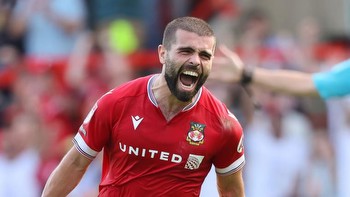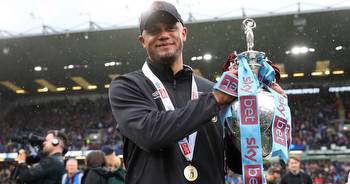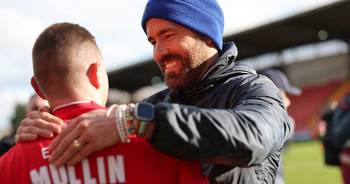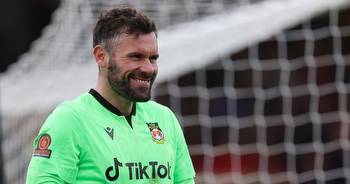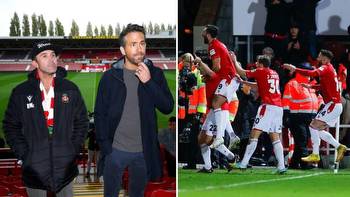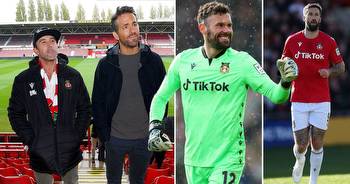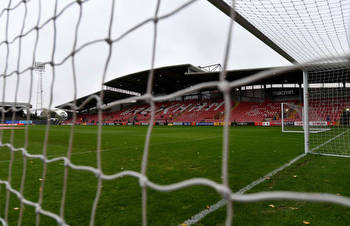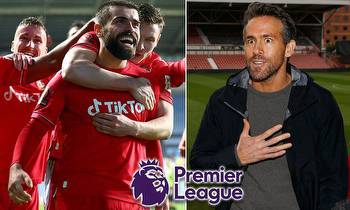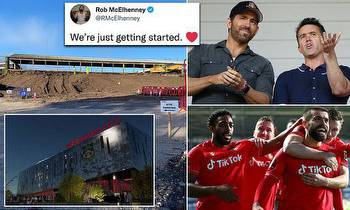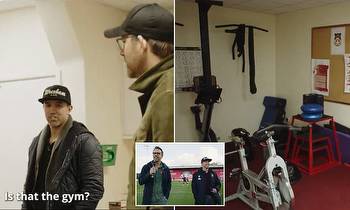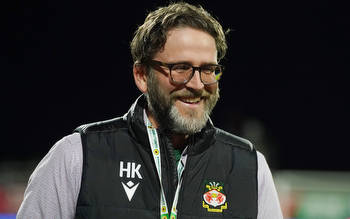Wrexham are back in the EFL

Love them or loathe them, the EFL will welcome its noisiest and newest member this summer as the Welsh club rejoins League Two having secured promotion as champions of the National League with a 3-1 win over Boreham Wood last weekend.
The Ryan Reynolds and Rob McElhenney revolution at the Racecourse Ground has brought unprecedented attention to English football’s fifth tier. That is likely to travel with them as they move up a step of the ladder, with their Disney documentary cameras and Hollywood stars in tow.
But what will it mean for League Two, and what happens in the National League now it has been left behind?
Wrexham’s rise has undoubtedly brought greater focus from an international audience on the lower leagues of the English game’s structure amid a rise in investment in EFL and National League clubs from US owners over the past few years. Streaming figures and the club’s social media presence are both up, while Reynolds and McElhenney’s clout led to a new streaming service, National League TV, being launched last December to allow fans at home and abroad to watch games more easily.
For the National League, in terms of television audience alone, Wrexham’s promotion represents a loss, although their battles to escape back to the EFL in the past two seasons have cemented its status as an unofficial ‘League Three’worthy of fans’ attention. Their rivalry this season with fellow former EFL side Notts County, which saw both clubs gather over 100 points as they battled for the division’s sole automatic promotion spot, reached a climax in what was effectively a title decider early this month.
The 3-2 win for Wrexham that day, featuring a last-minute penalty save by ex-Premier League and England goalkeeper Ben Foster, broke viewing records for UK broadcaster BT Sport’s National League coverage with an audience seven times bigger than the season average for games shown from the same league on its channels. Of Wrexham’s five appearances on BT Sport this season, viewership was 75 per cent higher than for its other National League match broadcasts.
While viewers who tuned in to coverage specifically for Wrexham might not stick around next season, those fans who have developed an affinity for the National League and have followed its social media channels are more likely to — figures from data insight company Horizm show its digital audience grew by 12.1 per cent between last June and this March. In the same period, and crucially following the launch of the Welcome To Wrexham documentary series on FX and Disney+ last August, the club’s digital audience rocketed from 747,855 to over 1.7million (a growth of 137.9 per cent).
“I think it’s brilliant, what they’ve done, genuinely,” says Jason Stockwood, chairman and co-owner of League Two club Grimsby Town,who defeated Wrexham 5-4 in a thrilling National League play-off semi-final last season on their way to promotion. “Towns like Grimsby and Wrexham need a new narrative. Football is almost a unique opportunity to try and create a more positive story and momentum for the town. The underdog story aside, which I do chuckle at a bit with the amount of money they’ve thrown into the club, it’s a wholly positive story because they (Reynolds and McElhenney) seem to genuinely care about the community and they’re showing up.
“They’re not outsourcing the work, they’re showing up to lend their personal energy and enthusiasm to it.
“And look, it’s good for football. It’s fun, isn’t it? There’s a real opportunity for the National League to build on the momentum next year. Wrexham and maybe Notts County getting promoted (via the play-offs) would be a loss, but equally, there’s a real opportunity for the leadership in the clubs of the National League to use the momentum. It was a unique moment in time to have two clubs like Wrexham and Notts County competing at such a high level.
“There’s definitely going to be a void but at the same time, everyone’s had to up their game. Those two clubs have been a rising tide to lift all boats, so the standard of the league is better than it’s ever been.”
The quality of the football as a product is a testament to the number of National League teams attracting — and selling on — EFL-level players, for example Chesterfield selling Kabongo Tshimanga, the fifth tier’s 24-goal second-top scorer last season, to a Peterborough United side who can still win promotion to the Championship this season for a reported six-figure fee.
There’s also the 100 per cent record this century of promoted National League sides being able to avoid coming straight back down from League Two. Seven of those 41 clubs went on to make it back-to-back promotions up to League One and last season’s champions Stockport County are aiming to become the eighth (which would be an impressive 19.5 per cent) in the coming weeks.
But as they enter the EFL, players and agents will see Wrexham as an opportunity for more than a relatively well-paid League Two move.
Paul Mullin’s decision to drop down two divisions to join the Welsh club from Cambridge United, months after winning League Two’s golden boot to help deliver promotion to League Onein 2021, has brought him a booming profile in the US that few could have foreseen before Welcome To Wrexham’s success. The 28-year-old striker has featured in adverts and promotion material with Reynolds and McElhenney, and in November is due to release a memoir titled My Wrexham Story. It’s a remarkable scenario for an active lower-league player.
Those who see events at the Racecourse as a circus rather than something to admire are in the minority and, as such, there will be no shortage of players craving a piece of the success happening at Wrexham.
Much like when Salford City won promotion to the EFL four years ago with their own high-profile owners in David Beckham, Nicky Butt, Gary and Phil Neville and Paul Scholes from Manchester United’s famed Class of ’92 group of academy products and a BBC documentary crew in tow, the perception of a club having vast wealth to sign players their rivals cannot afford has not made Wrexham popular in all quarters — and could pose its own challenges in the transfer market.
“We know they will have a big budget and they will probably be spending, but it’s going make it even more of a challenge,” says Grimsby’s Stockwood. “Football is about competition, about pitting yourself against the best and wanting to feel like when you get those victories — they mean something because of that. You’re always going to get people moaning about the spend.
“But the bigger philosophical point, to counter what I’ve just said, is what that spend does to distort the market values and what people will bid for players.
“There’s talk on Twitter about Gareth Bale coming out of retirement to play for them in League Two, which would be brilliant but surreal as well. And that’s why a regulator comes in. We need sensible constraints. We need to allow people to invest but it needs to be regulated as well because, otherwise, it distorts the whole market and that’s what we’ve seen again and again. Boundaries that are fair for everyone and make sure that the market isn’t distorted are also really important.”
The soft salary cap in League Two differs from the free-reign allowed on spending in the National League, but it is unlikely to hamper Wrexham much given the constraints limit spending on playing budget to 55 per cent of revenue from a club’s television rights, ticket sales and commercial income. From advertising associated with their social media posts alone, Horizm estimates the growth in Wrexham’s audience will have brought value in excess of £1million.
As their brand has grown, they can aspire to eclipse sponsorship deals originally signed in 2021. Those deals will be up for renewal this summer with the club in a stronger negotiating position and attendance figures guaranteed to be among the highest in League Two even before the completion of a new stand (due in time for the 2024-25 season) which would see capacity at the Racecourse grow to around 16,000.
National League clubs will feel the loss of Wrexham’s healthy away support visiting once a season, but interest in investment opportunities in EFL and fifth-tier clubs is booming in part thanks to their high-profile success.
Among the clubs Wrexham will be competing with next year who also boast US-based investors are Walsall, Crawley Town (though there’s still a very small chance they will be relegated) and Gillingham while, in the National League, Woking’s American chief executive and co-owner John Katz pointed to the potential for clubs to follow in the Welsh side’s footsteps as a reason we could yet see more non-League investment.
“It sort of comes back to real estate: ‘Don’t buy the nicest house in the neighbourhood, buy the cheapest house in the neighbourhood and build it up’,” Katz says. “You increase the value by building assets and part of that is having the right first team and the right manager. So number one, it’s the opportunity; number two, it’s about the passion; and number three, it’s doing something you really can’t do in the US.
“If you’re in the NBA (the world’s top basketball league), you can put a team together and win a championship and that’s all well and good, but the last-place team doesn’t drop down (get relegated). It’s that opportunity of accepting that the results can determine your future, good or bad. And you have to be willing to accept the bad with the good.”
Wrexham can look to last season’s National League champions Stockport County for inspiration on how to adapt to life in League Two — they are in the play-offs places and chasing a second straight promotion with two games of the 46-match regular season to go. But even with two extra promotion spots to aim at in their new league next season, it will be far from easy.
“Both Wrexham and Notts County are two massive away days, League One-style away days for us where you have full capacity and really good rivalries and fans,” says Stockwood. “I’m looking forward to what they can bring to League Two next year because that fairy dust is going to get sprinkled from Wrexham all over our league, isn’t it? And there will be competitive games as well because we know that money has dictated where you can finish in a league for a long time.
“But you only have to look at Luton (a non-League side as recently as 2014, now assured of a place in the Championship play-offs to decide who plays in next season’s Premier League) this year or Carlisle in League Two to see that you can overperform.
“So it’s as much about culture as money and it looks like Wrexham are doing it the right way. It will raise the quality in League Two. We’ll look forward to playing them again.”

